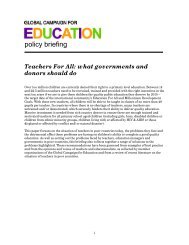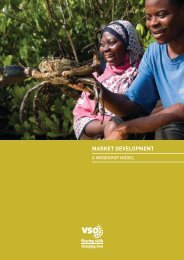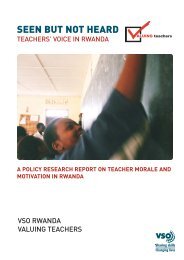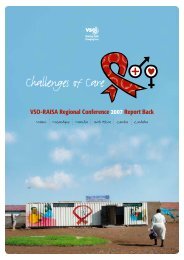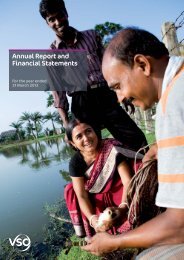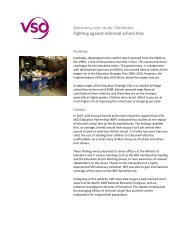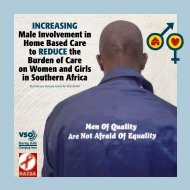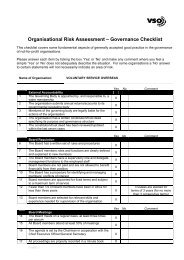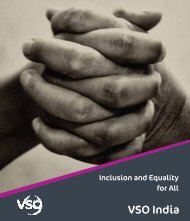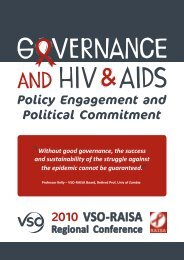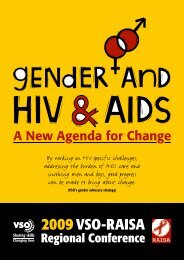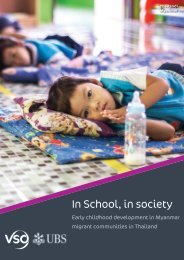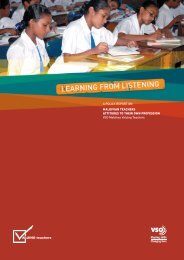Walking the Talk - VSO
Walking the Talk - VSO
Walking the Talk - VSO
You also want an ePaper? Increase the reach of your titles
YUMPU automatically turns print PDFs into web optimized ePapers that Google loves.
Box 4. The power of ART in Nigeria: from HIV and AIDS to health and wealth 154“My name is Mary Bulus, <strong>the</strong> third wife of late Mr Bulus. I live in Amper village, which is just 200 km from Jos.Unfortunately, after three months of marriage, our husband died of a ‘terrible health condition’. The o<strong>the</strong>r wivesalso died of <strong>the</strong> same condition.I went back to my parents. After some months, I started having frequent diarrhoea and drastic weight loss. I wasadvised to visit <strong>the</strong> hospital where I tested positive. It was <strong>the</strong>n I realised that my husband and <strong>the</strong> o<strong>the</strong>r twowives had all died of AIDS. The doctor lamented that my CD4 count was very low and that I stood little chancefor survival. I was very afraid. When <strong>the</strong> community people heard about my condition, <strong>the</strong>y stigmatised me andwould not buy <strong>the</strong> kunu zaki and zobo (local non-alcoholic drink) [that I sell] saying it must have beencontaminated with <strong>the</strong> virus. I started <strong>the</strong> ART drugs with <strong>the</strong> help of <strong>the</strong> church and Gospel Health andDevelopment (GHaDS), an NGO. Then I became stronger and could do o<strong>the</strong>r jobs.Two months later, I added weight and felt stronger. I decided to embark on farming. On one occasion in <strong>the</strong> farm,one of <strong>the</strong> villagers, surprised at my improvement said:“Am I seeing a ghost or a human being? Or have <strong>the</strong>y started removing <strong>the</strong> virus from those living with it?”I now live a normal life and my parents are happy to see me agile again. I have improved my farm and sell severalbags of grains to retailers in <strong>the</strong> market. This was made possible through <strong>the</strong> Positive Living Support Scheme ofN50,000 [about $400] provided by GHaDS. Right now I am <strong>the</strong> only benefactor who has paid back <strong>the</strong> loansuccessfully and have enough capital to sustain my business.”women living with HIV and who are using ARVs face acommon problem that our husbands or partners tend toforce us to give <strong>the</strong>m our ARV dose while he has nottested for HIV and doesn’t know his CD4 counts…Even if you refuse he will find where you keep yourmedicine and steal <strong>the</strong>m.” 148 Fear of disclosure andsubsequent violence, discrimination or abandonment alsoleads many women and girls to try to hide <strong>the</strong>irmedication in order to conceal <strong>the</strong>ir HIV status. A recentstudy of 560 women in Zambia, for example, found that76% of women on ART did not adhere to <strong>the</strong>ir treatmentas prescribed because <strong>the</strong>y were trying to hide <strong>the</strong>irpills. 149 More research is necessary however to determine<strong>the</strong> global impact of gender relations on women’sadherence to ART.While <strong>the</strong> adherence of some women to ART isundermined by economic dependency on <strong>the</strong>irhusbands, or inadequate information regarding <strong>the</strong>course of treatment <strong>the</strong>y must follow (see Chapter 2),efficacy of treatment may be undermined by lack ofaccess to food. Effectiveness of ART directly correlateswith a well-balanced diet. Lack of nutrients underminesan already weakened immune system, <strong>the</strong>rebyincreasing <strong>the</strong> susceptibility of women living with HIVand AIDS to opportunistic infections. According to <strong>the</strong>World Health Organization, “optimal antiretroviraltreatment requires safe, clean drinking water and abalanced diet rich in energy, protein and micronutrients…good nutrition and clean water may make antiretroviral<strong>the</strong>rapy easier to take and help ensure thattreatment works effectively”. 150However, in situations such as extreme poverty, naturaldisasters or conflict, food security may be compromised.Fur<strong>the</strong>rmore, such situations mean that women may beforced to choose between treatment and food. In onereported case, a 44-year-old woman in Tanzania sold asix month supply of ART to get money to take care ofher grandchildren. 151 New research conducted in twodistricts in Rwanda found that women living with HIVand AIDS who stayed behind in <strong>the</strong> villages had littlemoney to afford nutritious food while <strong>the</strong>ir men workedand lived in cities. Fur<strong>the</strong>rmore, despite <strong>the</strong> fact thatwomen ga<strong>the</strong>r, prepare and serve <strong>the</strong> food in almostevery society, research from multiple sources indicatesthat women eat last, after ensuring <strong>the</strong>ir partners andchildren are fed. In situations of famine, this oftenmeans that women may not eat adequately or don’t eatat all. 152For ART or treatment for opportunistic infections to beeffective, <strong>the</strong> full course of treatment must be strictlyfollowed and <strong>the</strong> correct dosage taken as prescribed.Failure to do so can increase an individual’s risk ofsevere illness or can lead, in some circumstances, to<strong>Walking</strong> <strong>the</strong> talk putting women's rights at <strong>the</strong> heart of <strong>the</strong> HIV and AIDS response 33



